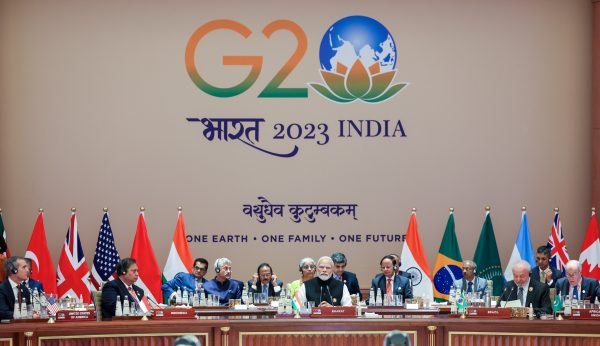India’s presidency of the 2023 G20 New Delhi Summit was a fitting reflection of how democratic and sovereign nations need to balance their multilateral and national interests, especially in the increasing absence of smoothly functioning global governance that can manage the consequences of deep economic integration. The contradiction between nationalist and international outlooks are being framed as ‘with-us-or-against-us’ pressures, especially in the Global South.
Both India and Indonesia, the 2022 and 2023 G20 hosts, took up the G20 presidency in a period of heightened geopolitical tensions — the Russia–Ukraine war, escalating US–China economic conflict, rising trade and techno-protectionism and the increasingly dysfunctional multilateral trading system. Both emphasised geopolitical stability as a prerequisite for global economic stability.
Like Indonesia, India used its position as the G20 president to advance discussion on the issues facing the Global South — food insecurity, multilateral order reforms, climate financing, digitalisation, debt, progress of Sustainable Development Goals in the post-COVID-19 landscape and female workforce participation.
Both Indonesia and India put the inclusivity principle into the G20 agenda, from economic growth recovery to international cooperation and multilateralism to digital transformation. The word ‘inclusive’ appeared 35 times in the G20 Bali Leaders’ Declaration in 2022 and 43 times in the G20 New Delhi Leaders’ Declaration in 2023.
India also elevated the position of the African Union from an observer to a member. Though this may raise questions about the G20’s legitimacy to decide who should and should not be part of this ‘exclusive’ grouping, India has perhaps won the legitimacy game as the spokesperson of the Global South, despite the absence of Chinese President Xi Jinping at the summit.
Besides building an international image, Indian Prime Minister Narendra Modi is also using the G20 presidency to build his own image at home. Like Indonesian President Joko ‘Jokowi’ Widodo, Modi has both projected an international image as a global statesman and domestically projected a nationalist image. Jokowi was applauded globally for the success of the 2022 G20 Bali Summit and the US$8 billion investment commitment secured during the summit, a win to his domestic image.
The 2023 G20 summit was also part of Modi’s projection of India and himself. With India’s general election slated for 2024, Modi’s portrayal as the voice of the Global South is positioning India in the global limelight, especially in the wake of China slowing down.
The G20 lotus flower logo — also the logo of Modi’s Bharatiya Janata Party — has been a linked to the election agenda and signals to the domestic population that the success of the G20 summit is borne by Modi’s statesmanship. The culmination of India’s G20 presidency was strategically placed only months away from the 2024 Indian general election.
Against the backdrop of India’s international image being questioned due to a perceived rise in religious strife, cronyism and oppression towards opposition, the G20 summit could also be perceived as a public relations tool in directing attention away from domestic issues, including the Manipur violence and communal unrest in certain parts of the country. Placing one of the meetings in Kashmir — a dispute hotspot between India, China and Pakistan —was a strategic move from India to project a sense of ‘normalcy’ in front of the international audience.
Despite remaining controversies, including the 2023 G20 Leaders’ Declaration’s watered-down language related to the war in Ukraine, both leaders should be attributed to the relative success of the G20 by bringing out a compromised joint consensus. Characterising the G20 presidency’s success as a win for one person — Jokowi or Modi — should be avoided. It must be viewed as a national achievement for the whole country. Otherwise, the continuity of the G20 legacy success could be under threat — and without a sense of national ownership, implementation could also be a challenge.
The real challenge is how both countries will translate their G20 success into a real turning point. Indonesia’s and India’s G20 declarations pledged to preserve the multilateral, open and rules-based international order. But soon after Indonesia’s G20 summit ended, Indonesia, in pursuit of its own national interest and national sovereignty, brushed off the World Trade Organization’s ruling on the nickel ore export ban. India’s export ban on rice and other trade policies are also misaligned with its G20 pitch on multilateralism.
The trend of middle and emerging powers from the Global South taking the reins of the G20 to fashion a fair and equitable global governance agenda is a welcome sign. But it is equally important that in leadership roles these powers take international and domestic accountability seriously to reflect the ideas that the G20 is founded on.
Maria Monica Wihardja is Economist and Visiting Fellow in the Media, Technology and Society Programme, the Indonesia Studies Programme and the Regional Economic Studies Programme at the ISEAS–Yusof Ishak Institute.
Sharon Susan Koshy is an incoming PhD candidate at the Australian National University.

